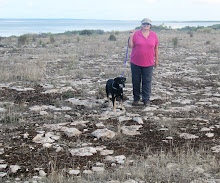
Mr. Fobres dec'd 23/12/07. A brief overview of Mr. Forbes, written by David Brooks, Snr. Anthropologist for Ngaanyatjarra Council. David wrote this for Papulankutja Artists in 2003.
The Photo is from Ngaanyatjara Council, Land and Culture Unit, taken at the Ngaanyatjarra Lands Determination.
Mr Forbes is a respected elder and major identity throughout the Ngaanyatjarra Lands. His home community and the country of many of his ancestors is around Blackstone, though he was born at a waterhole near the present-day community of Jameson. According to the Tjukurrpa (Dreaming) of his people, this waterhole was created by some travelling Kalaya (Emu) people who came from far to the west and through his birth there, Untjima Forbes is of this Tjukurrpa too.
When Untjima was born and through his early childhood, there were no white settlements in the Ngaanyatjarra Lands and the only white people that his family and relatives had ever seen were a few prospectors and 'doggers' who had wandered into these remote desert parts with their camels.
Though he came into contact with the Warburton Mission soon after it was established in 1932, he and his family kept up their travelling, hunting and gathering way of life in the bush for many years after that. This partially explains why he never learned to read and write, but more than this, throughout his life he has deliberately resisted the use of English in its oral and written forms. He has often expressed his belief that thinking in English changes the essence of his people's view of the world, pushing its central meanings to one side and ultimately disempowering them.
Untjima Forbes has an intimate knowledge of the Ngaanyatjarra landscape and its features over an area of several thousand kilometres; and he is the foremost repository in the regaion of immensely detailed Dreamings and songlines of the desert. Far from coming to him automatically, most of this knowledge had to be actively sought from his elders over the course of a lifetime. He was entrusted with these things because of his efforts and because of the intelligence and trustworthiness that he displayed to those senior men, all now dead.
While he has had many chances to visit different parts of Australia, particularly during those years when he played a major part in the land rights and 'homelands' movements of the desert, he chose, as in the case of learning English, to keep such forays to a minumum. While interested in the outside world, he has, during his 80-plus years, found more than enough to absorb his intellectual and spiritual needs within Aboriginal desert society.
